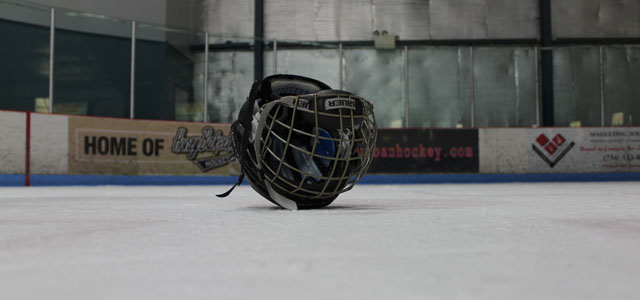Concussions: Knowing how to respond
By Michael Caples –
The Little Caesars Amateur Hockey League held their annual Face-Off Meeting at Motor City Casino on Sept. 25 to prepare youth coaches for the upcoming season.
The league directors brought in two big names from drastically different professions that had the same message for new and old hockey coaches alike.

Longtime Red Wings TV analyst and former player Mickey Redmond addressed the crowd of hundreds of coaches to remind them to both educate their players and keep them safe on the ice. With the increase of concussions at the NHL level, Redmond stressed that it is the responsibility of youth hockey educators to teach players how to play hard, yet safe, as they grow within the game.
“Where they’re trying to go at the NHL today — late but never too late — is have to respect for your opponent, and give up the check that means nothing,” Redmond said. “This check at center ice that doesn’t affect the game doesn’t do anything. I know we all want players to finish their check, I think we hide in that sometimes, but there’s times to hit, and times not to hit, and I think we need to teach that at this level. Get these kids thinking the right way about when to deliver a hit and when not to, and because you giving one up doesn’t mean you’re a bad player or your soft or any of that junk.”
Soon after Redmond’s message, representatives from the Beaumont Health System gave presentations to coaches promoting concussion awareness. To the right are some of the tips and things to watch for when a player potentially has a concussion.
Beaumont says that a concussion is a brain injury that:
- is caused by a bump or blow to the head
- is caused by an indirect forceful movement of the head, like riding a roller coaster
- can change the way your brain normally works
- can occur during practices or games in any sport
- can happen even if you haven’t been “knocked out”
- can be serious even if you’ve just been “dinged”
Some symptoms include:
- headache or “pressure” in the head
- nausea or vomiting
- balance problems or dizziness
- double or blurry vision
- sensitivity to light and noise
- feeling sluggish, hazy, foggy, or groggy
- concentration or memory problems
- confusion
- not “feeling right”
USA Hockey, along with the US Department of Health and Human Services, has provided an action plan if you suspect a concussion has occurred:
- Remove athlete from play.
- Ensure athlete is evaluated by an appropriate health care professional. Do not try to judge the seriousness of the injury yourself.
- Inform athlete’s parents or guardians about the known or possible concussion and give them the fact sheet on concussions.
- Allow athlete to return to play ONLY with permission from an appropriate health care professional.
Signs coaches should watch for in their player:
- appears dazed or stunned
- is confused about assignment of position
- forgets specific plays
- is unsure of game, score, or opponent
- moves clumsily
- answers questions slowly
- loses consciousness (even briefly)
- shows behavior or personality changes
- can’t recall events before or after the hit or fall


Pingback:Shaved Ice – Oct. 12